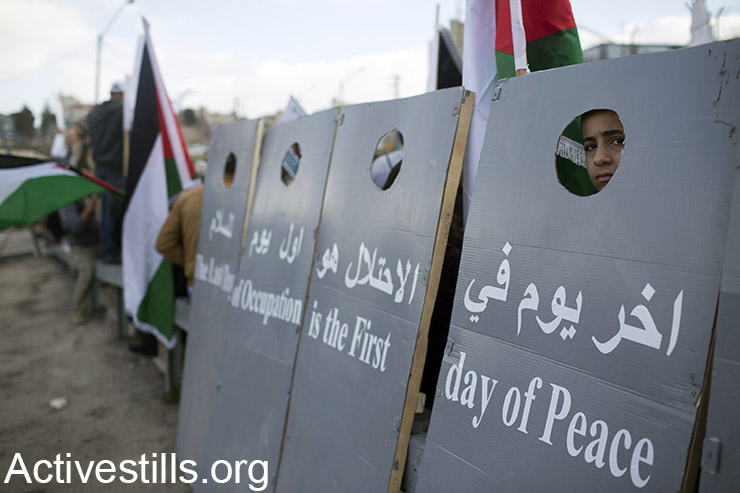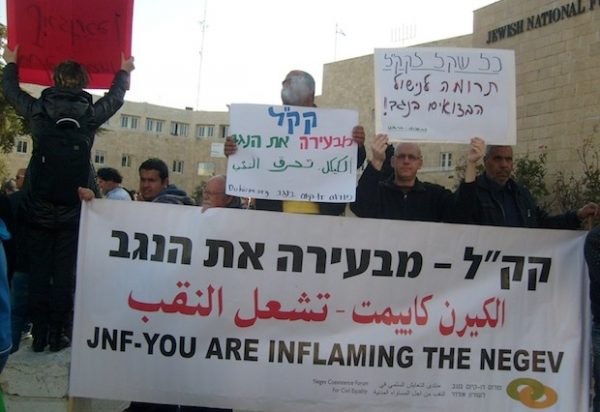Rather than focusing exclusively on Israel-Palestine, Western leftists should use the occupation as a starting point to examine their own role in oppression at home.
By Jakub Zahora

In early October last year, dozens of activists staged a “Global Sukkot against Demolitions” demonstration in front of the Jewish National Fund (JNF) building in Jerusalem. I participated in the event, which involved a coalition of anti-occupation groups and Bedouin citizens of Israel protesting against JNF-led plans to demolish four Palestinian and Bedouin villages in the Negev and the West Bank.
The protest was purposefully organized during Sukkot in order to appeal to the Jewish values and historical experiences underpinning this holiday, which in addition to its agricultural elements, also commemorates Jewish wandering and plight after the Exodus. Indeed, Jewish and Palestinian activists explicitly evoked themes of homelessness and dispossession during the protest in order to show the parallels between historical Jewish experiences and the current treatment of non-Jews by the Israeli state. The demonstration ended with activists declaring, “Not in my name.”
To my surprise, the slogan left me somewhat uneasy. Indeed, the discriminatory policies we were protesting had never been conducted in my name: I am not Jewish. Thus, this occasion made a question that had been haunting me for a while even more pressing: what is my position and that of other non-Jewish researchers and activists in Israel and Palestine, and what can we contribute?
I came to the region in fall 2015 to conduct my doctoral research on so-called “quality of life” settlements. Over the course of the year I spent in Israel/Palestine doing interviews, making observations and analyzing documents, I became deeply conscious of my own position there. Without buying into the narrative that equates criticism of the State of Israel with anti-Semitism, I became critical of what I perceived as the Western Left’s excessive focus on the Israeli-Palestinian conflict when compared to other instances of mass suffering and oppression around the world.
On the one hand, I am inclined to agree with opinions that single out Israel for its colonial policies, which stand in stark contrast to its self-proclaimed status of being “the only democracy in the Middle East.”

On the other, I also became convinced that being strongly opinionated about, and actively involved in resistance against, the Israeli occupation has become a sort of identity politics on the part of those Westerners who are eager to be seen as progressive. It seemed to me that involvement in pro-Palestinian activism for a month or two served as a kind of rite of passage for mostly young, college-educated leftists.
What further bothered me was that this exceptionalizing perception of Israel/Palestine was often accompanied by a rather essentialist take on the situation in the region, that went beyond the Orientalist, xenophobic and patronizing attitudes towards Palestinians I had steeled myself for when beginning my research. Thus, an acquaintance’s remarks that the untidiness of “Arab” cities in the West clearly demonstrated Palestinians’ cultural inferiority vis-à-vis Israelis, did not really surprise me.
More disturbingly for me, I repeatedly came across simplified and even dehumanizing language from some foreigners when discussing Israelis, a pattern I had a hard time reconciling with the self-declared leftist views of these individuals. I vividly remember another researcher, whose project also involved interviewing settlers, referring to them as “imports.” As I objected to this perplexing language, she seemed surprised and retorted “So how would you call them? Immigrants?”
I very much agree that settlers are part of the Israeli occupying regime. Yet, as I reflect on my personal and national history, I am forced to question certain leftists’ hasty condemnations. My family owns a large cottage in a mountainous area in the northern part of the Czech Republic. Located near the top of a hill, it has a beautiful view over a picturesque village and the surrounding hilly areas.
Yet this peaceful scenery is in fact a sort of monument to massive ethnic cleansing: before World War II, the village had been predominantly German, its inhabitants deported by the Czechoslovakian authorities in late 1945. Overall, around 2.5 million Czechoslovakian citizens of German background were expelled in the aftermath of the war, and several thousand instances of murder and rape occurred. With this in mind, I can hardly see the situation in Israel/Palestine as unique.

But most importantly, I found myself resentful of my own role in the research and activist industry focused on the region. I can understand the need of Jewish activists to protest and critically analyze Israeli policies, given that the State of Israel claims to represent them because of their religion/ethnicity.
But what am I to make of myself, an Eastern European gentile who has almost no personal connection to the region? Given that there is an abundance of racist policies and practices in my home country as well, how can I possibly justify my own research of the Israeli settlement project as opposed to, for instance, investigating the mistreatment of refugees by Czech authorities?
I do not have any definite answers to these questions, only tentative ideas. In terms of my research, I gradually started considering “quality of life” settlements as a somewhat extreme example of a wider phenomenon of how can people shut themselves away from violence that underpins their everyday lives.
Indeed, in my interviews with settlers the disturbing policies and practices of the Israeli rule that take place literally a hundred meters from them never came up. This perspective then helped me to see the power structures in the occupied Palestinian territories as less exceptional and more similar to other contexts, including the one I was born and brought up in.
I believe this attitude could be productive for others when approaching the conditions in Israel/Palestine. Perhaps it is not just about seeing parallels between the Israeli army’s daily harassment of Palestinians on the one hand, and mass incarceration of blacks in the U.S. or ghettoization of Roma citizens in the Czech Republic on the other. I came to the conclusion that we should also acknowledge how few differences there are between “economic” settlers commuting on Israeli-only roads in the West Bank, and us (non-settlers, non-Israelis, and in some cases non-Jews), in our comfortable gated communities and gentrified neighborhoods.
Adopting such a perspective thus does not call for refraining from criticism towards Israeli policies. Indeed, as racism and xenophobia once again become legitimate in Western public debates and political programs, practices that sustain the Israeli occupation of the West Bank should be seen as alarming examples of how easily violence against some segments of the population can become concealed, normalized and eventually accepted. Maybe, then, the case of Israel/Palestine can help us, Jews and non-Jews alike, to see more clearly our own daily compliance in oppression and dispossession in other contexts.
Jakub Zahora is a PhD student at the Department of International Relations at Charles University in Prague. In his dissertation he is looking into the politics of space and sight in large settlements in the West Bank.

